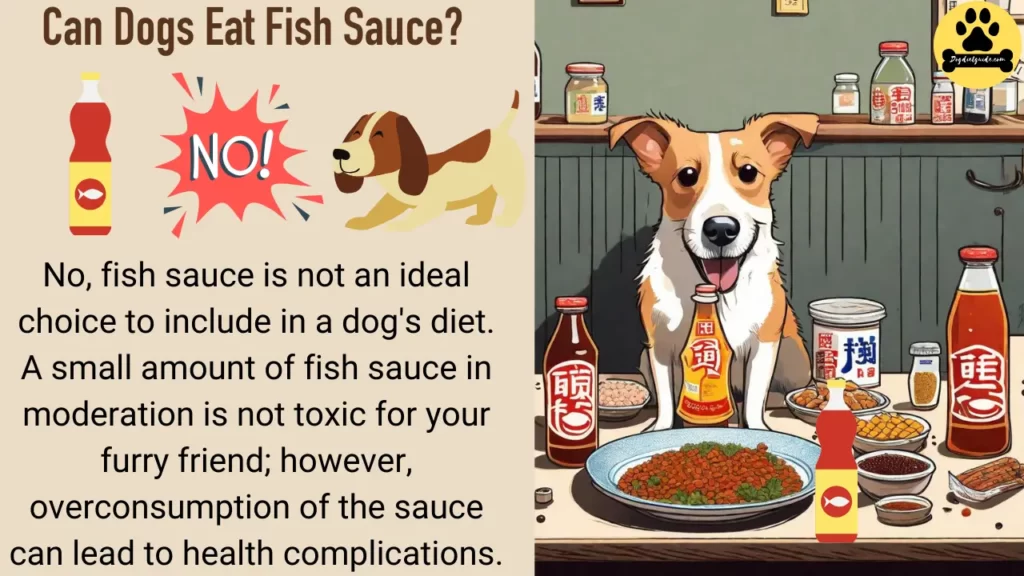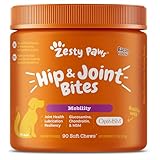As culinary enthusiasts explore diverse flavors and ingredients in their own kitchens, the question of whether certain human foods can be safely shared with furry friends arises. One such culinary curiosity revolves around fish sauce—a staple in many kitchens worldwide.
As conscientious pet owners seek to provide a balanced and wholesome diet for their dogs, the query “Can dogs eat fish sauce?”
Fish Sauce Is a Health Threat for Dogs
Dogs consuming fish sauce may face potential health risks, primarily due to its high sodium content. Excessive sodium intake can lead to conditions such as salt toxicity, causing symptoms like increased thirst, urination, vomiting, and diarrhea.
Basics of a Dog’s Dietary Needs
A well-balanced diet for dogs includes essential elements such as high-quality protein, fats, carbohydrates, vitamins, and minerals. Proteins, sourced from meat, poultry, and fish, are vital for muscle development, while fats contribute to energy and support skin and coat health.
Carbohydrates, found in whole grains and vegetables, provide additional energy. Adequate water intake is essential, and portion control is crucial to prevent overfeeding or underfeeding.
Avoiding toxic foods is imperative, and a dog’s life stage or special health needs should be considered when choosing their diet.
Can Dogs Eat Fish Sauce?
No, fish sauce is not an ideal choice to include in a dog’s diet. A small amount of fish sauce in moderation is not toxic for your furry friend; however, overconsumption of the sauce can lead to health complications. The primary risk of fish sauce for dogs is the presence of high sodium content.
Excessive sodium intake can lead to sodium poisoning, causing symptoms like increased thirst, urination, vomiting, and diarrhea. Some commercially available fish sauces may contain ingredients like garlic or onion, which are toxic to dogs.

Risks of Dogs Consuming Fish Sauce
Fish sauce for dogs is a condiment commonly used in many Asian cuisines, and it may pose some risks to dogs if consumed in significant quantities.
Following are potential risks associated with dogs consuming fish sauce:
- High Sodium Content:
- Risk of salt poisoning due to the extreme saltiness of fish sauce.
- Symptoms include vomiting, diarrhea, lethargy, tremors, and seizures.
- Additives and Ingredients:
- Some fish sauces may contain toxic ingredients like garlic or onions.
- These ingredients can lead to hemolytic anemia in dogs.
- Allergies:
- Potential for allergic reactions to fish proteins in the sauce.
- Allergic symptoms may include itching, hives, or gastrointestinal upset.
- Pancreatitis:
- High-fat content in certain fish sauces can contribute to pancreatitis.
- Pancreatitis is a serious and painful condition that requires veterinary attention.
- Gastrointestinal Upset:
- Strong flavor and smell of fish sauce may cause nausea, vomiting, or diarrhea in some dogs.

Benefits of Fish Sauce For Dogs
Serving a small and plain amount of fish sauce without added toxic ingredients to your furry friend’s regular diet, only with vet advice, may add some health benefits.
- Rich in Omega-3 Fatty Acids:
- Promotes healthy coat, skin, and joints.
- Protein Source:
- High-quality protein for muscle development.
- Vitamins and Minerals:
- Provides essential nutrients like vitamin D and selenium for bone health and immune function.
- Anti-Inflammatory Properties:
- Omega-3 fatty acids have anti-inflammatory benefits, potentially aiding dogs with conditions like arthritis.
- Supports Cognitive Health:
- DHA in omega-3 fatty acids may benefit brain function, particularly in aging dogs.
- Good for Skin and Coat Health:
- Essential fatty acids contribute to a shiny coat and can alleviate skin issues.
- Aids in Joint Health:
- Omega-3 fatty acids are associated with joint health, potentially benefiting dogs with joint conditions.
Please remember, when it comes to fish sauce for dogs, the risks outweigh the benefits. It’s best to avoid giving it to your puppy.
Dog-Friendly Fish Sauce Alternatives
Is fish sauce safe for dogs? While traditional fish sauce may not be suitable for canines due to its high salt content and potential additives, there are alternatives that can add flavor to your pet’s meals without compromising their health.
Dog-friendly fish sauce alternatives include homemade fish broth, low-sodium fish stocks, or simply incorporating small amounts of cooked fish into their diet.

Related Post: Are Rice Noodles Safe For Dogs?
Best Practices for Feeding Dogs Fish-Based Products
If you decide to include fish-based products in your pup’s diet, it’s crucial to do so in moderation. Choose high-quality, low-sodium fish products, and ensure they are free from harmful additives like garlic or onion.
Always introduce new foods gradually to monitor your dog’s reaction and consult with your veterinarian before making significant changes to their diet.
Homemade Dog-Friendly Fish Sauce Recipes
For pet owners who enjoy preparing homemade meals for their puppy, creating a dog-friendly fish sauce is a viable option.
Simple recipes using fish broth, water, and dog-safe herbs can provide a flavorful alternative to commercial fish sauces. These homemade options allow you to control the ingredients and tailor the sauce to your dog’s preferences and dietary needs.
Precautions When Offering Fish Sauce to Dogs
Before incorporating fish sauce into your dog’s diet, consider the following precautions:
-
Ensure the fish sauce does not contain harmful additives like garlic or onion.
-
Choose low-sodium options and be mindful of your dog’s overall sodium intake.
-
eek professional advice before introducing new foods into your dog’s diet to ensure they meet their specific nutritional needs.
-
Gradually introduce fish sauce to monitor your dog’s reaction and prevent adverse effects.
Related Post: Can Dogs Eat Hearts of Palm?
Final Thoughts: Can Dogs Eat Fish Sauce?
In conclusion, the answer to the question Can dogs eat fish sauce? is a clear No. While fish sauce may have some benefits for humans as well as dogs, the risks are 90% higher than the benefits. So, it’s best to avoid feeding any compromised food to your furry friend and stick with healthy alternatives.










![Can Dogs Eat Blood? 7 Side Effects [Expert Opinion]](https://petskor.com/wp-content/uploads/2022/04/Webp.net-resizeimage-12.jpg)
